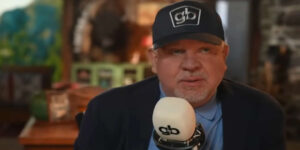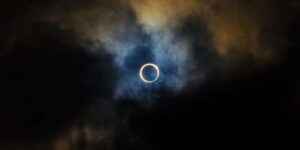The Mystery of the Hanukkah Menorah
The Bible speaks of the menorah, or lampstand, on three levels: one in the Torah, one in the Prophets and one in the New Covenant. Moses was commanded to build a seven-branched golden lampstand and place it in the Holy Place of the Tabernacle (Ex. 25:31-40).
The priests were required to take care of the lampstand, but there was no clear teaching as to the spiritual meaning of the menorah. When there is no clear teaching on something in the Torah—such as the Feast of Trumpets—it is often because it can only be understood in light of the New Covenant.
In the Hanukkah story, the Jews, led by Judah Maccabee and his small army, defeated the Syrian king, Antiochus Epiphanies. It was considered a miracle that this tiny army of Jews could defeat the massive Syrian force.
Antiochus Epiphanies “devastated Jerusalem in 168 B.C.E., defiled the Temple, offered a pig on its altar, erected an altar to Jupiter, prohibited Temple worship [sacrifices], forbade circumcision on pain of death, sold thousands of Jewish families into slavery, destroyed all copies of Scripture that could be found, and slaughtered everyone discovered in possession of such copies, and resorted to every conceivable torture to force Jews to renounce their religion.”
The Menorah
After the surprising Jewish victory, the temple, including the menorah, was rededicated by the Maccabees as they celebrated the new holiday of Hanukkah. (Hanukkah means “dedication.”) The lampstand at Hanukkah is called in Hebrew a Hanukkiah. It has nine lights that represent the eight days the menorah in the temple remained lit, despite having only enough oil for one day (according to tradition) and an extra candle, called the shamash, that is used to light the others. Though most American Jews call this a menorah, it is not a replica of the tabernacle menorah. Nevertheless, it was clearly meant to represent the temple menorah in Jewish religious tradition, as it commemorates the miracle of the seven-branched menorah during the temple’s rededication.
A Sign of Restoration
On the second level, the prophet Zechariah saw a vision of a mystical menorah with two olive trees—one to each side. This symbolized the Lord restoring Zion and the temple by the power of His grace and Spirit (Zech. 4:1-10). This vision became the basis for the symbol and seal of the modern state of Israel.
The Body of Messiah
The third level is found in the book of Revelation, in which John has a supernatural vision of Yeshua in a glorified form, standing in the midst of seven lampstands. It is more likely, if we are going to be consistent with Scripture, that it was either a menorah that John saw, with seven branches, or seven menorahs with 49 lights in total. The word for lampstand in the Hebrew Scriptures is almost always menorah, a seven-branched candelabra. In the Greek translation of the Old Testament, the same word is used for menorah as John used for lampstand in Revelation. In the Hebrew New Testament, lampstand is translated as menorah. Furthermore, the menorah(s) in Revelation are made of gold, just as God told Moses (Ex. 25).
Each branch of the menorah (or each menorah) represented the seven churches or congregations of Asia Minor (Rev. 1:12, 20), which are symbolic of all types and streams making up the international ecclesia, or body of believers. And let’s not forget—everything in the temple was an earthly shadow of a heavenly reality (Heb. 8:5). The menorah represents the worldwide body of believers.
As the Mosaic lampstand found expression in Jewish religious tradition, Zechariah’s prophetic vision found expression in modern Zionism, and John’s vision pictures people of every tribe, tongue and nation being glorified by the power of God.
Unity Brings God’s Fire
We know that the menorah in the temple had to be built according to the pattern God gave Moses. (“Be sure to make them according to the plans you were shown on the mountain” [Ex. 25:40].) So if John’s vision of a seven-branched menorah was representative of the united body of believers, then fire must also have meaning.
Without the menorah, you cannot have fire—certainly not a contained, managed, focused fire. Once the menorah was built, it could be lit. In the same way, when the believers gathered on Shavuot (Pentecost) in unity—with one purpose and focus, waiting on the Holy Spirit—they became that spiritual menorah that could be lit, and the Spirit came as tongues of fire. In fact, the image of the 120 with flames of fire upon them is an image of one menorah with many branches. Each branch is on fire, doing the will of God.
With the menorah is in place—just as Yeshua instructed (“But stay in [Jerusalem] until you have been clothed with power from on high” [Luke 24:49])—the fire or Holy Spirit could not only fall upon, but also function through each believer. The fruit was that 3,000 men, plus women and children, were born again that day.
The lesson is that like the menorah, the body of Messiah must be built according to the heavenly pattern. Yeshua tells us in John 17 that His deep desire is for unity. Only when the body is in unity can the Spirit flow as He desires (Acts 2). Gossip, backbiting, dissensions, jealousy and the like all work to thwart the authentic fire of God.
Only the Servant Can Light the Candles
It is interesting that in Jewish tradition, it is that one special candle, the shamash, that leaves His special position above the other candles to come down and give light to the other unlit ones. Shamash means “servant.” Once the shamash has brought light to the other candles, He then takes His place, once again, above the others. Unbeknownst to most religious Jews, this is played out in Philippians 2:
“Who, being in very natureGod, did not consider equality with God something to be used to his own advantage; rather, he made himself nothing by taking the very nature of a servant [Shamash!], being made in human likeness.
“And being found in appearance as a man, he humbled himself by becoming obedient to death—even death on a cross!
“Therefore God exalted him to the highest place and gave him the name that is above every name, that at the name of Yeshua every knee should bow, in heaven and on earth and under the earth, and every tongue acknowledge that Yeshua the Messiah is Lord, to the glory of God the Father” (Phil. 2:6-10).
Shine Your Light!
One more thing. According to Jewish tradition, we are to take the lit Hanukkiah and place it in a window to declare the Hanukkah miracle to all who would see it. Was Yeshua thinking of this (even though the tradition came later) when He said, “You are the light of the world. A town built on a hill cannot be hidden. Neither do people light a lamp and put it under a bowl. Instead they put it on its stand, and it gives light to everyone in the house. In the same way, let your light shine before others, that they may see your good deeds and glorify your Father in heaven” (Matt. 5:14-16)?
Or, “I am the light of the world. Whoever follows me will never walk in darkness, but will have the light of life” (John 8:12)?
You also might find it interesting to know that Yeshua himself celebrated Hanukkah. In John 10:22, it speaks of Him being in Jerusalem for the Feast of Dedication (Hanukkah). What is the lesson?
- Strive for unity (Phil. 1:7).
- Expect the Holy Spirit (Acts 2:1-4).
- Let your light shine (Matt 5:14-16).
Asher Intrater is the apostolic overseer of two congregations in Israel. He also leads Revival Israel and international prayer ministry in Jerusalem. He is the author of Who Ate Lunch With Abraham? and Covenant Relationships.
Ron Cantor is the director of Messiah’s Mandate International in Israel, a Messianic ministry dedicated to taking the message of Jesus from Israel to the ends of the earth (Acts 1:8). Cantor also travels internationally teaching on the Jewish roots of the New Testament. He serves on the pastoral team of Tiferet Yeshua, a Hebrew-speaking congregation in Tel Aviv. His newest book, Identity Theft, was released April 16. Follow him at @RonSCantor on Twitter.






































